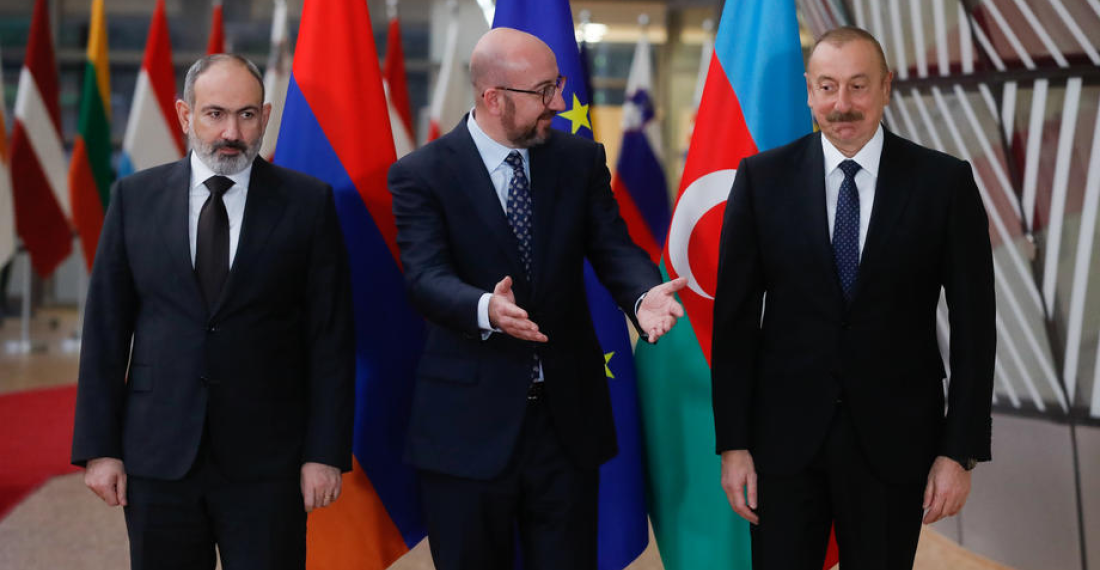This editorial was first published in the 6 July 2023 issue of our newsletter, Karabakh Concise. If you would like to subscribe to Karabakh Concise or any other of our newsletters, please click here.
Another summit between Armenian prime minister Nikol Pashinyan, and Azerbaijani president, Ilham Aliyev will take place later this month in Brussels, facilitated by the president of the European Council Charles Michel. The region is currently abuzz with diplomatic activity as the international community urges the sides to bring their negotiations to a successful conclusion.
At the end of June in Washington DC the foreign ministers of the two countries met under the auspices of US Secretary of State, Antony Blinken. A read out of the meeting indicates that progress was made but substantial disagreements on key issues, such as the future of the Armenian community of Nagorno-Karabakh, remain also.
Many observers think this will be the make-or-break issue. In the Armenian-populated part of Nagorno-Karabakh opinion on how to engage with the Azerbaijanis remains divided too – some want to engage, others are defiant in refusing. An Azerbaijani diplomat, speaking in The Hague this week, once more reiterated Baku’s current official line that Azerbaijan will not grant any special status for the Karabakh Armenians, and that their rights will be guaranteed according to the provisions of the Azerbaijan constitution. Armenian officials continue to insist on the need for an international mechanism to oversee the process, and the international community is generally of this opinion as well.
It is likely that some tough discussions will take place over the summer. Time is now against those who want a peaceful solution. The momentum for peace in Baku and Yerevan is already fragile, and unless a breakthrough can be registered, even maintaining this momentum will become very difficult.
The summer brings with it several challenges. Reducing incidents on the Armenia-Azerbaijan border and in the Nagorno-Karabakh conflict zone most surely now be a priority. Serious negotiations should not be taking place with violence in the background. Instead building up the momentum for peace through various track 1.5 and track 2 initiatives is hugely important.
In this regard three meetings which took place in The Hague this week were significant.
The Joint Armenian-Azerbaijani Liaison Group on confidence-building measures in support of lasting peace in the South Caucasus (JOLIG) held its 4th plenary meeting in The Hague, the Netherlands, on Tuesday 4 July 2023.
The members of the Joint Liasion Group are: Ahmad Alili (co-rapporteur); Mehman Aliyev; Stepan Grigoryan, Tatevik Hayrapetyan, Taron Hovhanisian, Shahla Ismayil; Gulmammad Mammadov, Gevorg Melikyan, Johnny Melikyan, Benyamin Poghosyan (Co-rapporteur), Ramazan Samadov and Anar Valiyev. JOLIG is an independent initiative facilitated by LINKS Europe and supported by the European Union. The LINKS Europe team at the event was led by its Director, Dr Dennis Sammut.
Intensifying the work on the ground, and engaging the youth generation in the quest for peace.
At its meeting, the Group exchanged views on the current state of Armenia-Azerbaijan relations, and on its work in support of the Armenia-Azerbaijan normalisation process.
The Joint Liaison Group agreed that over the next months it will increase its work on the ground, including through the holding of dialogue meetings in Armenia and Azerbaijan and through implementation of some of the ideas contained in their report of April 2022: “The South Caucasus from war to peace: thirty measures between now and 2030”. The Group was pleased to note that one of the proposals contained in that report, the holding of an annual youth peace summer school, is on the way to being implemented with the first summer school scheduled to be held in Kachreti, Georgia, from 21-31 August with the participation of thirty young people from the region. On 4 July in The Hague JOLIG members participated in the Preparatory Meeting of the South Caucasus Youth Peace Summer School and agreed to support the initiative in every possible way.
The Group highlighted the importance of engaging the young generation in the South Caucasus to think positively and ambitiously about the future of the region – one that is free from conflict and violence, and for the young generation to be brought fully in the conversation on the future of the region. The Group hoped that the Regional Dialogue Forum (29-31 August) at the end of the forthcoming Summer School will be a good opportunity for such dialogue, not only between different nationalities, but also between different generations.
Reaching out to Governments and track 1 stakeholders
On 5 July 2023 in The Hague, members of the Joint Liaison Group participated in the Policy Dialogue Conference: “The South Caucasus and the European Union – addressing challenges, seizing opportunities”, organised by LINKS Europe, with the participation of diplomats, officials, experts, opinion shapers and civil society activists from Armenia, Azerbaijan and Georgia.
The conference was also addressed by Toivo Klaar, EU Special Representative for the South Caucasus; Dirk Scheubel, EU Special Representative for the Eastern Partnership; and Jaap Friedriks, the Special Envoy of the Netherlands for the Eastern Partnership; Elshad Iskanderov, Ambassador-at-large at the Ministry of Foreign Affairs of Azerbaijan; Tigran Balayan, Ambassador of Armenia to the Netherlands; David Solomonia, Ambassador of Georgia to the Netherlands; and Rahman Mustafayev, Ambassador of Azerbaijan to the Netherlands; as well as other speakers from across the region and the EU.
Armenian and Azerbaijani diplomats need a ceasefire too
Whilst the leaders negotiate, and the foreign ministers engage in intensive detailed discussions, Armenian and Azerbaijani diplomats continue exchanging sharp comments and rhetoric at different international fora. Most of the narratives are tired and dated, but since they come out of the mouth of state officials they cannot be ignored. Baku and Yerevan should issue clear guidelines to their diplomats to ensure that there is at least a softening of the rhetoric. That can be a confidence-building measure too, and such initiatives are now needed.







